Current as of: December 23, 2025 - 07:10

Wildlife & Wilderness of Botswana Trip Notes
- Ways to Travel: Guided Group
- Destination: Botswana, Zimbabwe
- Programmes: Wildlife
-
Activity Level:
2 out of 7 - Easy & Moderate
- 14 Days: Land Only
- Ages: 16+
- Trip Code: WZT
- Carbon Footprint: 27kg CO2e
Trip Overview
From the Okavango and Victoria Falls to safari lands, experience Africa’s natural world at its most dramatic
Journey into the wilds of Botswana. Glide along the Okavango Delta in traditional mokoro canoes helmed by local polers and admire a billion stars from the otherworldly and eerily silent Makgadikgadi Pans. Search for the emblematic wildlife of Africa on the Savuti Marsh and Moremi Reserve and take to the Chobe River, home to the highest concentration of elephants anywhere. Finally discover why Dr David Livingstone, upon seeing Victoria Falls, declared ‘scenes so lovely must have been gazed upon by angels in their flight.
At a Glance
- Accommodation: 2 Classic nights (lodge/chalet), 11 Simple nights (4 camps, 7 wild camping)
- Travel by Toyota Land Cruiser
- Group normally 4 to 12, plus leader. Minimum age: 16
Highlights
- Immerse yourself in Botswana’s wild side, witnessing immense landscapes and safari icons
- Glide along the Okavango Delta in mokoro canoes helmed by master polers
- Wild camp under the starry African sky, serenaded by hippos, elephants and lions
- Experience the silent beauty of the otherworldly Makgadikgadi Pan
- Rise early to game drive in Chobe National Park, the best spot on the planet to see elephants
- Witness the mighty Victoria Falls, one of the Natural Wonders of the World
Is This Trip for You?
This trip is rated Activity Level 2 (Easy & Moderate) with a Wildlife Rating of Four.For more information on our trip gradings please visit the Activity Level Guidelines page or our Wildlife Holidays page for more on our Wildlife Ratings. If you have any queries about the difficulty of the trip please do not hesitate to contact us.
Transport
Expect some long and hot drives as we travel between game parks. On some days, we travel on paved roads, but a lot of distance is covered on dirt and sand roads. Depending on water levels, driving in the delta can also be challenging. Vehicles can be difficult to get in and out for persons of reduced mobility.
Camping
During the full-service camping safari, we have a separate supply vehicle with a camp crew who set up camp for us. The camp crew will also cook the food, wash the dishes and attend to all camp chores, so you can fully enjoy the wilderness.
We normally use Botswana Tourism (HATAB) sites, which are only available for private groups. There are no facilities in these remote locations, so we use bush toilets and a bush shower. These sites are not fenced and have no running water. We carry a water supply on our vehicles and fill up daily from public sites. There is plenty of water in which you can wash, but we must be sparing. This all adds to the remote wilderness experience. Other nights will be spent in developed campgrounds with facilities usually including toilet blocks, a bar and, sometimes, a swimming pool.
Weather
October and November are the hottest months, but are also good for game viewing. Please see the Weather & Seasonality section of the Trip Notes for more information.
Legal note
All group members joining this tour will be asked to sign an indemnity form at the start of the trip. This indemnity form is a requirement of the South African Tourism Service Association of which our local supplier is a member. As a client of Exodus Travels Ltd, your rights under the Package Travel Regulations (1992) are unaffected, and Exodus remains liable for the actions of our sub-contractors.
Water safety: This trip includes time by a lake, river or sea, where there may be opportunities to swim. You should always seek local advice before deciding whether to swim. Open-water or wild swim spots should be treated with extreme caution. Information on how to keep yourself safe while swimming is shown here.
Group
There will be one tour leader who normally also arranges the meals and cooking. The tour leader is assisted by a driver/guide, and for larger groups there will be a support vehicle with two staff.
Adult min age: 16
Min group size: 4
Max group size: 12
Itinerary

Land Only
- Start City: Maun
- End City: Maun
Land Only Itinerary
The adventure begins at our campsite on the banks of the Thamalakane River. You can arrive at any time and make use of the site facilities, which includes a bar, swimming pool and much-loved restaurant.
Around 6pm, say hello to your tour leader and fellow travellers where we gather as a group for the first time to get to know each other and learn more about the adventures ahead.
Your tour leader then ensures a big welcome over a group dinner together.
Want to explore further? Secure pre-tour nights through your sales representative.
Accommodation: Audi Camp (or similar)

We pack minimal gear for two nights into a smaller bag (provided), before a 4×4 transfer into the Okavango Delta. At the polers’ station, we meet a team from a nearby village who will look after us during our stay in the delta. With them, we travel in mokoros (traditional canoes) deep into the Okavango Delta. We have lunch at our riverbank campsite, and then our first game walk in the late afternoon. We return to camp before sunset and for our first meal in the African bush.
Accommodation: Okavango Delta wild camp

We get up early this morning for a game walk with a guide from the poling team. There are never any guarantees with wildlife, but there is the chance of seeing elephants, buffalos and other smaller game. We return to camp for brunch and time to relax. In the afternoon, we take a short mokoro trip on the river to view the sunset before returning to camp.
Accommodation: Okavango Delta wild camp
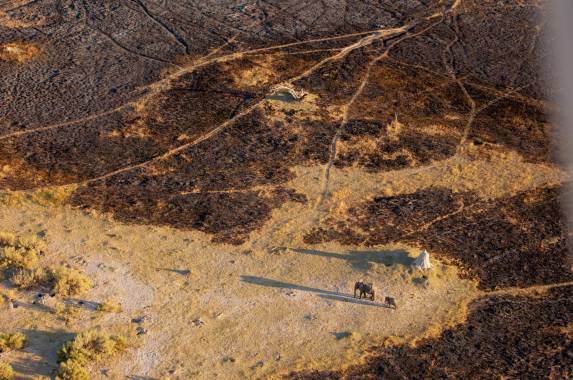
This morning, we board our mokoros for the trip back to the polers’ station. We meet our vehicle and transfer back to Maun for the night, where we will purchase supplies for the days ahead. The afternoon is free to relax by the pool or take an optional scenic flight over the delta.
Accommodation: Audi Camp (or similar)
After a relaxed breakfast, we head east to the vast Makgadikgadi Salt Pan. We camp wild on the pan or one of the campsites nearby, depending on the conditions. The Makgadikgadi Salt Pan covers more than 6,180sqmi (16,000sqkm) and forms the bed of an ancient lake – now dried up. The sunsets here are spectacular.
Accommodation: Makgadikgadi Pan wild camp (or similar)
Today we have a long drive north before crossing into Zimbabwe to Victoria Falls, a town minutes from the waterfalls of the same name. At the Kasangula border, we complete border formalities and continue to our accommodation for the next two nights. The falls themselves are more than 5,580ft (1,700m) wide and 330ft (100m) tall, making them the largest waterfalls in the world.
Accommodation: Premier Lodge (or similar)

Today is a free day to take part in one of the many optional activities on offer, including white-water rafting, flights over the falls and various others.
Accommodation: Premier Lodge (or similar)
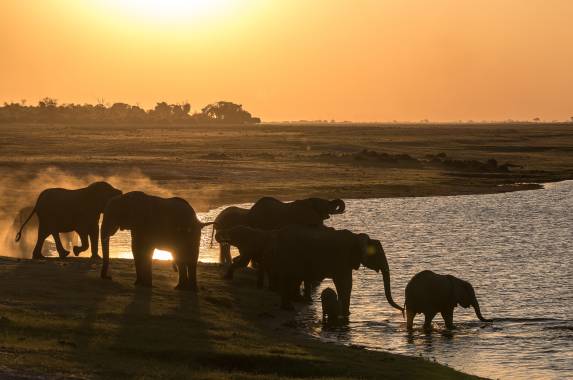
This morning, we can view the Victoria Falls from the Zimbabwean side, before returning to Botswana. It’s then a short drive from the border to the town of Kasane, where we camp by the Thebe River, a tributary of the mighty Zambezi. The afternoon is free, with an option to view game on a cruise down the Chobe River. This is widely regarded as one of the best game cruises in Africa with a very good chance of seeing elephant herds drinking from the river before sunset.
Accommodation: Thebe River Camp (or similar)
We take an early morning game drive back to the Chobe Waterfront area. Chobe is famous for its large population of elephants but is also home to plenty of other game, including lions and wild dogs. After exploring the northern end of this huge park, we head south into remote, rugged terrain, passing in and out of the national park, before finally reaching the Savuti Area at the southern edge of the park. Here, the Savuti Marsh is fed by the Savuti River channel, which alternately flows and then dries up for years at a time. Recent flooding has given this area new life. It’s home to plenty of game, but is especially well known for lions, and the large numbers of elephant that walk enormous distances to find fodder.
Accommodation: Zwei-Zwei or Savuti wild camp
We take morning and afternoon game drives on the Savuti Marsh. There is a good chance of seeing the lions, cheetahs and hyenas that follow the seasonal zebra migration through this area. Large secretary birds and kori bustards are often seen strutting around the marsh and small red-billed francolins provide a noisy morning wake-up.
Accommodation: Zwei-Zwei or Savuti wild camp
After breaking camp, we drive to Moremi Game Reserve. Along the way, we pass through a variety of habitats, including the Mbabe depression, Mopani forest and past great Acacia trees before arriving at Khwai village and the North Gate entrance of Moremi Game Reserve. Moremi National Park is the jewel in Botswana’s wildlife crown. Protecting much of the northern part of the Okavango Delta, it encompasses waterways, marshes, islands and open grasslands.
Accommodation: Moremi wild camp
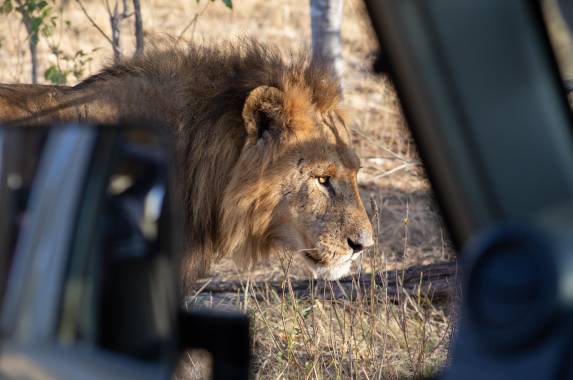
We take morning and afternoon game drives through this beautiful, protected area, looking for the large variety of animals that live here. Despite its wet reputation, there is plenty of dry land in Moremi, which allows our game drives to cover significant distances while spotting game in the sometimes-dense vegetation. It’s a good place to spot elephants, lions, leopards and cheetahs, while red lechwe, a water-dwelling antelope, are often seen grazing among the lilies.
Accommodation: Moremi wild camp
We go on a final game drive through the park this morning before returning to Maun and our riverside campsite. We can enjoy the swimming pool before our last dinner at the campsite restaurant.
Accommodation: Audi Camp (or similar)
The adventure ends after breakfast and we begin our return journey home. If you want to extend your time in Botswana please speak to your sales representative who will be happy to advise.
Accommodation
Camping in the African wilderness
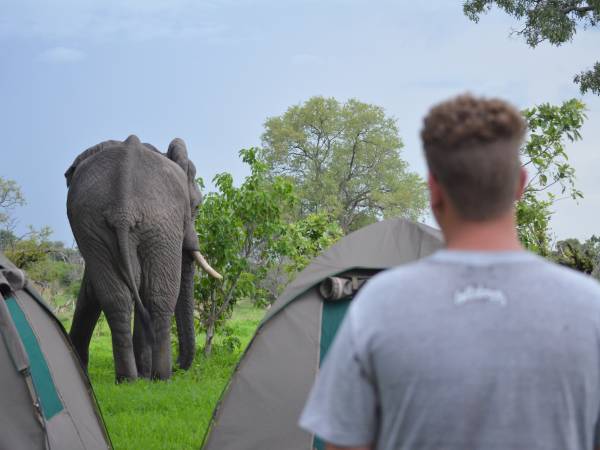
Camping in the African wilderness is a bucket list-worthy experience and Botswana is a fantastic destination for this.
We spend 11 nights camping (seven of those wild camping) and two nights in a hotel/lodge. When we stay at public campsites, we have access to excellent facilities; however, the nights spent wild camping are the real highpoint.
We sleep in spacious, two-person tents fitted with mattress-topped camp beds. For the wild camping nights, there is a bush shower and toilet, while dinner is taken around our campfire.
Wild camping in the Okavango Delta
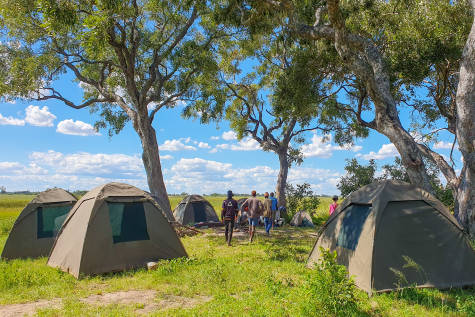
The highlight stay on this trip for many is our two nights wild camping in the Okavango Delta. Our neighbours, which you’ll likely hear shuffling around at night, include hippos, elephants and lions, while our away-from-it-all location normally allows us to see a night sky illuminated with stars.
Worth knowing
- All camping equipment is provided except for sleeping bags and pillows.
Single supplement from £ 335
Food & Drink
- Breakfast: Cereals, coffee and toast and the occasional fried breakfast/brunch.
- Lunch: Cheese, cold meats, salads, bread or rolls.
- Dinner: Potjies (stew), braais (barbecue), stir-fries, etc.
Vegetarians and vegans can be well catered for on this holiday. Please inform us before departure of any special dietary requests so our local team can be well prepared.
The trip leaders do all the shopping and meal planning for each group. They will always try to obtain fresh produce wherever possible. Each tour has one cool box for meat and fresh produce only and one cool box for cold drinks. We supply squash, tea or coffee with meals. All other beverages will be at your own expense.
On some days where early morning game drives are included, lunch may be substituted for a large brunch on return from the game drive – this is customary. We will always ensure the number of meals detailed in the trip notes are provided.
The water provided on this trip is safe, clean drinking water, normally from boreholes. You can buy bottled water if you prefer, but we encourage you to make use of the safe drinking water provided as this helps diminish plastic consumption.
Transport
We use a 4×4 vehicle, seating 12 in four rows of three. It has a solid roof to protect the group from the sun and canvas sides that are mostly kept up for great game viewing. We use this vehicle as it is perfect for wildlife watching, which is the focus of our trip. It does mean, however, that it can get windy on transfers between safari parks. When we have small group sizes, we use a trailer for our equipment. For large groups, there will always be a support vehicle. The vehicle has evenly spaced foot holes for access to the back (rather than doors) and is manageable for any reasonably fit person.
Drive times (all approximate):
- Maun to the Okavango Delta round-trip: Two hours each way
- Maun to Makgadikgadi: Four hours
- Makgadikgadi to Victoria Falls: Seven hours, including border crossing
- Victoria Falls to Kasane: Two hours
- Kasane to Savuti: Eight hours, mostly game drives, some transfer
- Savuti safari: Six to eight hours, all game drives
- Savuti to Moremi: Eight hours, mostly game drive, some transfer
- Moremi safari: Two game drives, each three hours
- Moremi to Maun: Three-hour game drive plus two-hour transfer to Maun
Weather & Seasonality
There is no best time to visit the Okavango Delta, as it flows year round. The wettest season is January and February, when travel on dirt roads becomes difficult. March to September, although dry and bright, can be cold at night (in June and July it can be chilly – but no colder than 5°C, so bring appropriate gear).
Delta water levels reach their highest in July. From December to June, water levels in the Zambezi are at their highest, and the spray can be seen several miles away as it soars as much as 500ft (150m) in the air. October and November are the hottest months, and midday temperatures can be very uncomfortable. The rains normally start slowly in late November. December can be wet, but it does not rain for long periods and should not put anyone off travelling, as there is always plenty of sunshine.
Joining Instructions
Joining Instructions
Start hotel: Audi Camp, Lekawen Drift
Phone: +267 75 323 065
Recommended arrival time: You can arrive at any time today. There will be a welcome briefing around 6pm in the evening.
Airport: Maun Airport (MUB)
Getting to the start hotel
The start hotel is approximately a 15 to 20-minute drive from the airport. We provide one group transfer from the airport to the hotel, which you can join at no extra cost, provided you can be at the airport before the transfer leaves. Speak to your sales representative for the transfer times or to arrange a private transfer.
Catching your return flight
There’s one group transfer to the airport, which you can join at no extra cost. Please speak to your sales representative for the time of the transfer. If the group transfer does not suit your flight time, speak to your sales representative to arrange an alternative.
Please note, unless specified otherwise, the transfers will be to the start (or pre-tour) hotel and from the end (or post-tour) hotel and will be on the date on which the tour starts/ends; transfers to other hotels in the same city and/or on different dates may attract an extra charge. Transfers should be booked with your sales representative at least two weeks before the tour starts.
Full joining instructions including local emergency numbers will be sent to you as part of our Final Joining Instructions. If you do not receive these at least a week before departure, or require them earlier please contact our office or your travel agent.
Location start: Maun
Location end: Maun
What To Take
Essential Equipment
In addition to your ‘normal’ daily clothes:
- Neutral coloured clothes (for the game walks)
- Long-sleeve clothing and long trousers (pants) to protect from mosquito bites after sundown
- Some warmer clothes, windproof jacket and warm fleece for the colder months (June to August temperatures can drop to freezing at night)
- Lightweight walking boots or trainers
- Buff or scarf for dusty drives
- Sunhat
- Sunscreen
- Sunglasses
- Insect repellent
- Two/three-season sleeping bag (lighter sleeping bag for October/November)
- Camping pillow or similar
- Daypack
- Wet wipes or hand sanitizer gel
- Towel
- Head torch/flashlight (with spare batteries)
- Portable charger/battery pack for you camera
- Water bottle
Plastic bottles are a big issue in many countries where recycling isn’t yet widely available; they often end up in landfill sites or get burnt, both processes are harmful to the environment and we would like to reduce our impact here. For your trip, we have decided to include drinking water in order to reduce the amount of plastic used. This means that safe filtered drinking water will be available throughout which means all you need to do is bring a bottle to re‐fill along the way. Please add this to your packing list.
Please note, it is possible to get laundry done in Maun and Victoria Falls.
Optional Equipment
- Binoculars and a camera with a zoom lens (at least 300mm) if you want good animal shots
- Waterproof bags (to protect valuables on the mokoros)
Spare space? If you have room in your luggage, consider bringing items to donate to schools and villages − your tour leader can assist in delivering them once you’ve arrived.
Much-need items included:
- School stationery, including pens, pencils, crayons, erasers, rulers and notebooks
- Card games
- Balls, including (deflated!) footballs and tennis balls
- Toiletries, including toothpaste, toothbrushes and soap
Practical Information
Visa
Botswana
Currently British and Commonwealth and European passport holders do not require visas for Botswana.
If you are transiting through South Africa and are a non-UK passport holder, you may require a transit visa. Please check before travelling.
Please be aware that children under the age of 18 must provide a full birth certificate (a short one won’t be accepted) as well as a valid passport. If the child is travelling with only one parent or with another adult, the missing parent (or parents) will have to provide an affidavit giving their consent for the child to travel. If flying via South Africa, you may have to pass immigration between flights and the same regulation is needed for entry into South Africa.
Zimbabwe
Most nationalities, including British require a visa to visit Zimbabwe. This can be obtained on arrival in Zimbabwe. The current charge for a single entry visit visa issued on arrival in Zimbabwe is US$55, although this could change. If you have not obtained a visa before travelling, you should bring enough cash with you to pay for your visa on arrival. You should ensure you have small notes as immigration officers may not be able to provide change.
If you plan on visiting Zambia as well then there is the UNIVISA for USD50 (a shared visa for Zimbabwe and Zambia) that will allow you multiple entries into Zimbabwe. Please note that the UNIVISA is sometimes unavailable if the immigration officers do not have the necessary paperwork. Alternatively a double entry visa for Zimbabwe (US$70.00) is available to UK passport holders and some other nationalities.
Please note that if flying via South Africa you will probably have to pass immigration there. Children under 18 will have to have an unabridged birth certificate showing the names of both parents. If the child is travelling with only one parent, they will need to have an affidavit from the other parent, of no more than three months, confirming the child can travel with the other parent; a court order granting full legal guardianship of the child; or a death certificate of the deceased parent.
Vaccinations and Health
Botswana
There are no required vaccinations. However, you may want to consider vaccinations for hepatitis A, polio, tetanus, typhoid, cholera, hepatitis B, rabies and tuberculosis. You will also need a yellow fever vaccination certificate if you have travelled from (or transited through) a country with risk of yellow fever transmission. Please confirm with your doctor or travel clinic. We also suggest you seek advice from your doctor or travel clinic about which malaria tablets to take.
Zimbabwe
There are no required vaccinations. However, you may want to consider vaccinations for hepatitis A, tetanus, typhoid, cholera, hepatitis B, rabies and tuberculosis. You will also need a yellow fever vaccination certificate if you’re arriving from a country with risk of yellow fever transmission or transiting for more than 12 hours through a country with risk of yellow fever transmission. Malaria is also a known risk. Please seek advice from your doctor or travel clinic on the best course of action for all the above.
Malaria prophylaxis is essential on this trip, and we suggest that you seek advice from your GP or travel health clinic about which malaria tablets to take.
Local Time
Botswana's time zone: Africa/Gaborone (UTC +02:00)
Zimbabwe's time zone: Africa/Harare (UTC +02:00)
Electricity
Botswana’s electricity: Plug types M (three round pins) and G (three rectangular pins) – 230V, 50HzBots
Zimbabwe’s electricity: Plug types D (three round pins) and G (three rectangular pins) – 240V, 50Hz
Clients can charge camera batteries at the Maun, Kasane and Victoria Falls campsites. The vehicle is also fitted with an inverter to allow you to charge your batteries while on the move, but space is limited so you should not rely on this being available.
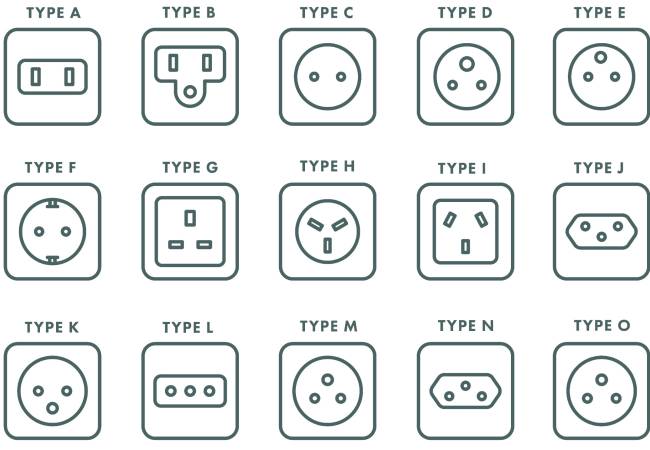
Money
Botswana's currency: Botswana pula (BWP)
Zimbabwe's currency: Zimbabwe gold (ZiG), though US dollars are primarily what is needed in Victoria Falls. South African rand is also accepted to a lesser extent.
ATM Availability
There are ATMs in Victoria Falls in Zimbabwe, Maun and Kasane in Botswana – these are the only places with ATMs, but you should not rely on these for all your money. It is advisable to have some Botswanan pula, obtainable locally, and to bring some US dollars (after 2017) in smaller denominations for payments at more informal establishments in Zimbabwe .
Credit cards are widely accepted, including for all optional activities in Victoria Falls and Maun; however, some operators may add a five-percent surcharge.
Extra Expenses & Spending Money
- Meals not included: Approximately 260 Botswanan pula (US$25) per person for an evening meal
- Incidentals: Allow about 120-180 pula (US$9‐US$14) per day
Optional excursions (approximate costs, depending on group sizes)
All prices listed are subject to change:
- Boat Cruise on Chobe River: US$29 and US$14 for the park entry fee
- Okavango Delta Helicopter flights: US$185 – US$550 per person depending on passenger numbers(maximum of three people per flight)
Victoria Falls:
- Entrance fee to Victoria Falls: US$50
- Helicopter flight over falls:
- 12min‐13min: US$150 plus park fees of US$15
- 25-minute game/scenic flight: US$284 plus park fees of US$15
- White-water rafting:
- Half day: US$126 plus park fees of US$10
- Zambezi sunset cruise: US$45 plus park fees of US$10
- Zambezi sunset cruise and dinner: US$88 plus park fees of US$10
- Night game drive in Hwange (2 hours in an open-air vehicle): US$60
Further activities are available in Victoria Falls but have not been risk assessed by Exodus.
Tipping
Our local staff are paid fairly for their work; however, tipping is part of the culture in Africa. For suggestions on how much to tip, we recommend:
- Tour leader: US$5 per person per day
- Drivers: US$3 per person per day
- Safari/boat guides: US$3 per person per day
- National park guides: US$5 per person per day
- Polers in the Okavango Delta: 200 pula (US$15) per person
- Restaurants: 10% of the bill
Tipping is voluntary and can be declined if service was unsatisfactory.
Sustainability and Impact
As a certified B Corp, we’re on a mission to improve our social and environmental impact across all our adventures.
We do this through our innovative Thriving Nature, Thriving People plan.
This ‘nature positive’ approach is designed to help nature and communities thrive in harmony through practical solutions, such as reducing carbon and waste on our trips, supporting conservation projects through the Exodus Adventure Travels Foundation, and rewilding 100 square metres for every Exodus traveller.
Important Information
Optional activities and excursions
If you would like to join an optional activity or excursion outside those listed in the itinerary, your leader may be able to assist with selecting a provider. However, Exodus has not assessed the safety standards of activities or excursions that are not listed in the Trip Notes. All optional activities or excursions are undertaken at your own risk.
Important Information
Your Safe Participation
When booking this trip, you should be confident in your ability to participate in all activities described in these Trip Notes. If you have any doubt about your suitability, please call us and ask to speak to one of the experts on this itinerary.
Although our leaders are well trained to deal with different capabilities, if they have any concerns about someone’s ability to safely take part in an activity, or their impact on other people’s enjoyment, we authorise them to take necessary action which, in some circumstances, may involve asking someone to miss that activity.
By booking this trip you agree to our Booking Conditions which clearly state that our leaders have the authority to do this. In these rare instances we will ensure anyone sitting out is safely provided for and offered alternative options where possible. Refunds will not be provided for activities missed and customers may be liable for additional costs incurred.
Seatbelts
All vehicles used by us should be equipped with working seatbelts, except where approved by us based on the vehicle type or journey. Wherever seatbelts are available, we require our customers to use them for their own safety, even where it may not be a legal requirement.
Travel Safety
For additional information please have a look at the travel safety advice page on our website.
How to Book
Speak to our friendly team of experts to plan your adventure:
- Check availability: our website shows real-time availability or contact our team by phone, email or live chat.
- Hold a space: You can provisionally hold a space to give you time to finalise your travel plans.
- Confirm your booking: Payment of a deposit will complete your booking and secure your place on the trip.
After booking
You will receive a confirmation document and invoice, which includes extra information and guidance about your travel arrangements. Our dedicated Customer Operations team will help you with any pre-travel questions or arrangements and can easily add extensions or extra accommodation to your booking. Final Joining Instructions will usually be sent out two to three weeks prior to departure.
Adding transfers to your booking
If you have arranged your own flights and would like to add transfers to your booking, please provide your arrival and departure details to our Customer Operations team around four to six weeks before departure.
- Where free transfers are included, they are available for any flight but can only be added to your booking once we have received your flight schedule.
- Where group arrival and departure transfers are available, these operate at fixed times. You will need to arrive in time to meet the scheduled transfer. If the timings don’t align with your travel plans, our team can arrange private transfers once they receive your flight schedule.
Trip Note validity
Trip notes may be updated after booking; if any updates significantly impact the inclusions or itinerary you will be advised in writing. A link to the most up-to-date Trip Notes will be sent out with your Final Joining Instructions before departure.
The information in these Trip Notes is given in good faith. All holidays can be subject to unexpected changes, and occasionally it may not be possible to follow the itinerary as planned. In these circumstances we will make the best-possible alternative arrangements that maintain the integrity of the original itinerary.

